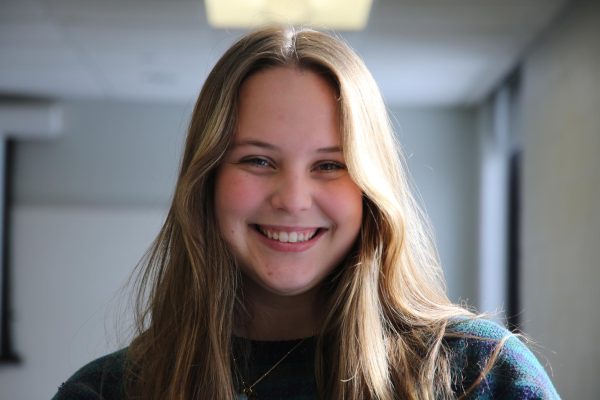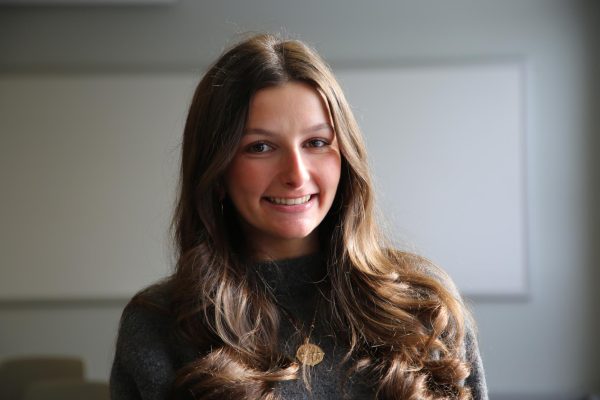Eshika Attri ’26 – food marketing major, member of Women’s Leadership Initiative
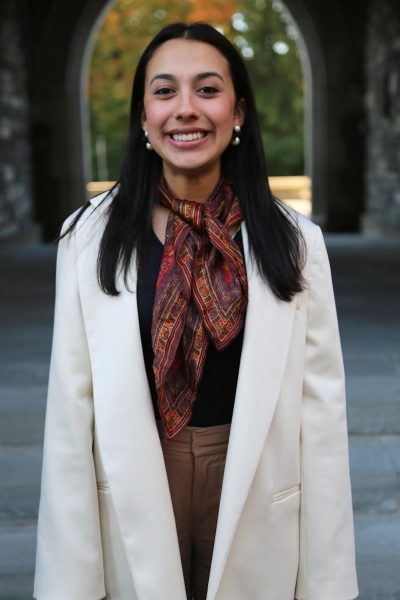
- How do you think St. Joe’s has changed in terms of inclusivity and support for women since you’ve been here?
“I think it’s definitely gotten more eager to be more inclusive and show more support. Through any DEI initiative on campus, it really is within the student body to start that change. But each year, especially with the new upcoming class, I’m getting more and more excited about the initiatives that they’re bringing and how eager they are to spark some change.”
- What challenges have you found specific to women in your field? How have you overcome them?
“I feel like women, especially in business, have a really huge burden on them to always be right and to always have something introspective to say, whereas that is not necessarily the case for men who can just raise their hand to say a joke or just do whatever, honestly. It’s still a work in progress, but I think, ultimately, it just revolves around bringing your authentic self in every single space that you occupy, whether it’s at work with your family, with your friends, and it really starts in those small spaces and then translates to the bigger ones.”
- Are there any women role models or mentors who have inspired you in your journey?
“I think having role models and having mentors are the most important thing a woman can have, especially early on in a career because you need someone to help pull you up. My former boss at Chobani, shout out Kathleen McHugh, she really sort of sparked this journey of getting involved and not being afraid to make a mistake in a meeting or within a business setting. But [in] just my day to day, it’s my mom … She shows me every single day to persevere, be strong and just do everything with intention. Also, she gives the best fashion advice. So she’s also my fashion role model.”
- What does leadership mean to you, particularly in the context of advocating for women’s rights and representation?
“I think it’s just always knowing what you stand on and stand for, just having good morals and good values and making sure that you’re not gonna bend that for anybody, whether it is within your relationships, within the jobs that you’re doing, sort of sticking by those core values.”
- What is the kind of impact WLI strives to make at St. Joe’s?
“I think just making sure that there is a space for women to flourish and bring our authentic selves on campus. Not only that, but it’s a great resource to help pull women up and help them develop as leaders. Because traditionally, St. Joseph’s hasn’t really played that role. It has been more geared towards more of the male leadership roles, and we see that even in our leadership as presidents. I mean, we just had our first female president, and that just shows that it’s a long process of change, but we’re finally making change, and that’s really, really exciting to see.”
Jo Parker, Ph.D., professor emerita of English, former director of Gender Studies Program
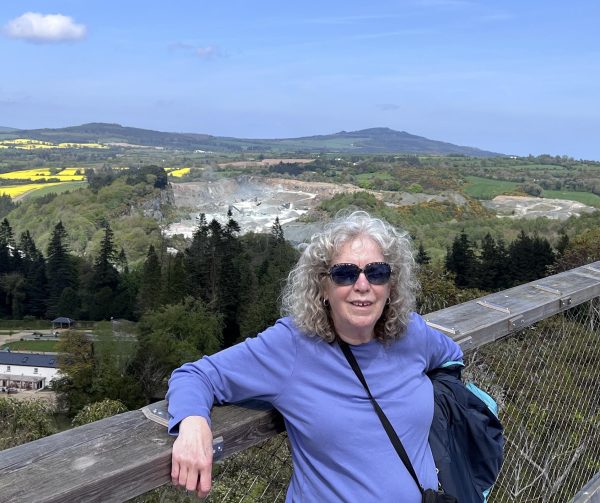
- How do you think St. Joe’s has changed in terms of inclusivity and support for women since you’ve been here?
“At the time I was there, there were 14 members of the [English] department, and only three were women. I think that you see much more representation of women in the faculty. There’s [also] been much more attention, not just to women, but to the LGBTQ+ community – the genderless bathrooms, for example. And so I think that St. Joe’s has continued to make efforts to make the environment more inclusive.”
- What challenges have you found specific to women in your field? How have you overcome them? What kind of support did you receive (or not receive) from St. Joe’s?
“When I came to St. Joe’s, I had a child who was one, and I’m certainly not the only person who’s done this. So there was a lot of juggling at the time. St. Joe’s did not have a daycare facility, which it now has. So it was sometimes entailing bringing in my child if her daycare was unavailable … And people were always helpful. There were kind of unofficial support groups, but I think getting the daycare facility was good for the campus.”
- Are there any key changes you think are still necessary for gender equity in the academic field/workplace?
“[When I was there] we had the women’s potlucks, and I think that was something that we all found important to see, ‘Oh yes, there are other women here at St. Joe’s,’ and it made us feel a certain connection … So the fact there isn’t a women’s potluck anymore, I think, is a bit of a sign that women do feel like they’re much more a part of the university. The fact that the president of the university is a woman is kind of almost mind boggling … The president is a woman, the provost is a woman. These are administrative role models.”
- Are there any women role models or mentors who have inspired you in your journey?
“Dr. Eileen Cohen, Dr. Mary Schmelzer, they were women I learned from. And I would say Sister Betsy Linehan.”
- What was something from teaching gender studies in literature you think everyone should learn in their educational career?
“I think one thing that is important for students and everyone to learn is the way in which gender can be socially constructed. Now, what we see as appropriate masculine and feminine behavior has to do with the societal and historical context. … In the 18th century, 19th century, you have these very dominant male voices who are trying to prescribe what is appropriate female behavior, and it meant being submissive, docile, basically keeping your mouth shut. You have this feminine ideal that women come along and begin to fight against.”
- What challenges were you faced with being involved with a program like Gender Studies, which, at the time, was brand new? Was there pushback?
“I was also a member of the alliance, which, at that time, was the group supporting LGBTQ students. I would say that was the group where the pushback was. It was mainly external but not entirely external … [But] when I think about early days of gender studies, there was concern — and I think this was one of the concerns that led to the whole idea of a woman studies program — there was a concern that there would be an advocacy for abortion rights.”
Ann Green, Ph.D., professor of English
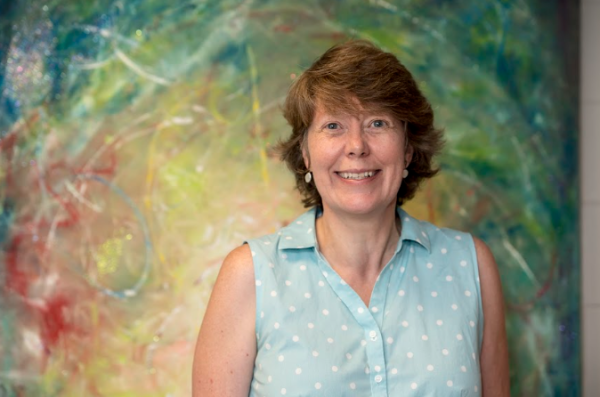
- What challenges have you found specific to women in your field, and how have you overcome them?
“There’s a lot of pressure on women faculty that comes from the structure of academia, which is still built on the model where it’s a man who doesn’t have to worry about childcare or their spouse or doing their laundry or cooking the meals. And for so many women, caregiving, whether it’s for an elder or a child, is baked into your role … I’m trying to change and advocate for women so that the women who were hired after me maybe don’t have it with so many challenges and difficulties.”
- Who are some of the women role models and mentors who inspired you in your journey?
“Dr. Catherine Murray, who was in psychology, Dr. Eileen Cohen, who was in my department, Dr. Jo Parker, those were three women who were more senior to me when I started, and they mentored me in really important ways … it’s just really been a privilege to work with really powerful women who began at St. Joe’s when there were less than 10 women on the faculty.”
- How do you incorporate diverse perspectives into what you teach at St. Joe’s?
“Every time I teach a class, I try and think about who’s represented and what that looks like. Are the people in the room going to be able to identify with the text we’re reading and the content we’re doing? It’s so important to see yourself in the educational spectrum. Each course I teach is designed to be as inclusive as possible, and the way I teach, I try very hard to recognize the gifts of what each person brings to the class and their intersectional identities.”
Sheridan Leak ’25, biology major, president of the Black Student Union
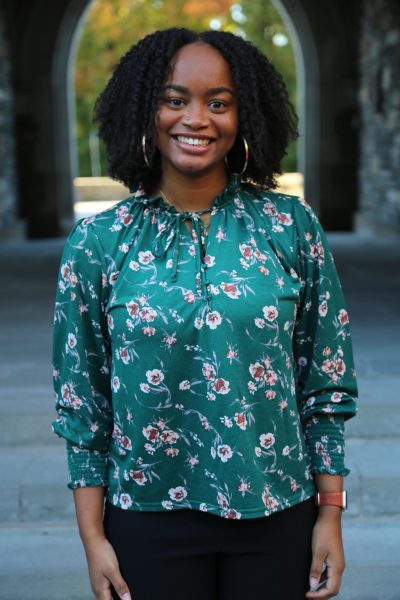
- Are there any key changes you think are still necessary for gender equity in the academic field or the workplace on St. Joe’s campus?
“I think as long as we keep making spaces that women feel comfortable and continue, because as times change, we change with it, and we are flexible in our policy making and in our enforcement of those policies, just to make sure that every student feels comfortable on campus, feels safe on campus, feels welcomed, regardless of their gender identity.”
- Who are the women role models or mentors who have inspired you in your journey?
“I have countless alumna I consider big sisters for me, but for staff here, in my position as president of the Black Student Union, the leadership at the Center for Inclusion and Diversity is outstanding, and they’re both women. Ms. Natalie Walker Brown and Ms. Gabrielle Stevenson are both incredible people. They keep the CID running. They keep everybody happy.”
- How do you describe ongoing efforts within the Black Student Union to advocate for Black women or address issues related to gender and race?
“The intersectionality of those two identities are also really important. … Black Student Union, specifically, we have female leadership within our executive boards, and we are obviously working with other female leaders. So we are always really inspired and motivated to make sure that our programming reflects that part of our mission to empower our Black women.”
LaNyah Sabb-Toombs ’27, theatre & film major, secretary of the Black Student Union
- How can you describe ongoing efforts within the Black Student Union to advocate for Black women or address issues related to gender and race?
“I feel definitely giving women the opportunity to be in charge and giving women the opportunity to also put their foot down and take the step forward to something new and something to take advantage of their future.”
- What have you gained from being a woman student leader in BSU on campus?
“I learned a lot about myself. And also a lot about wanting to lead the group that I am a part of, especially as a part of the Black community, I feel like that’s a big thing and a big role within that. So, I just learned to take charge and take ownership of what I do and how I do it.”
Christine Flanagan, professor of English
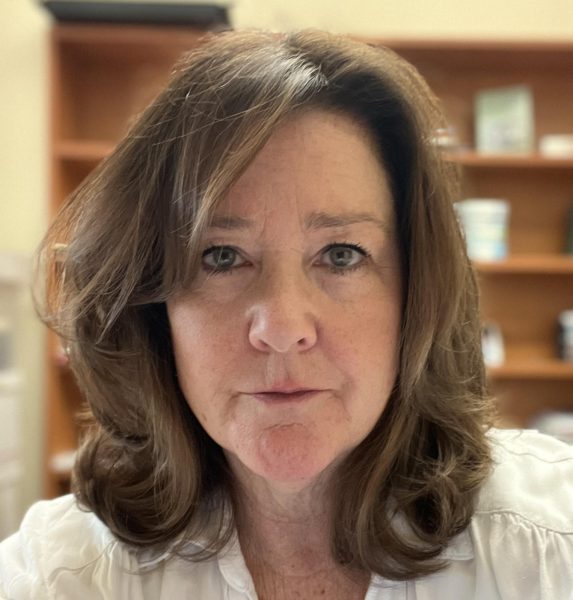
- What challenges have you found specific to women in your field, and how have you overcome them?
“The standards that have been set in this world generally,you don’t want to draw attention to the fact that you’re a woman. You want to draw attention to the fact that you’ve published something interesting or that you’ve done a good job teaching or you do service.”
- How do you approach teaching literature, especially works by women writers?
“When people talk about invisible bias or unconscious bias, it applies to ourselves as well. I remember years ago, looking down at my syllabus, and it was all male writers. I was like, ‘Where are the women?’ … It’s part of a bigger project, too. Where are the other voices? Where are the African American voices? Where are the voices of other cultures? Where are the voices from outside of my direct experience?”
Jordan Gouge ’25, president of the Student Nurse Association of Pennsylvania’s chapter on St. Joe’s Lancaster campus
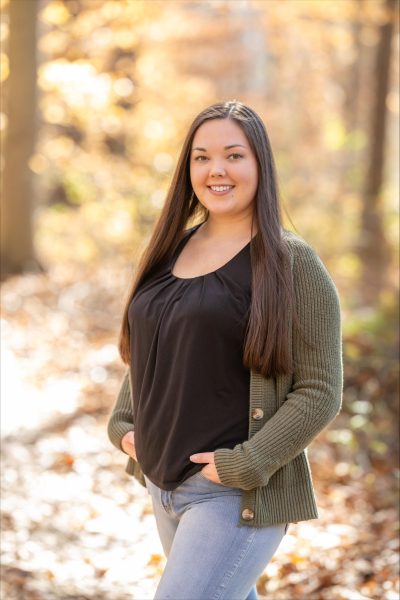
- What inspired you to pursue nursing, and how has your experience been as a woman in the program here?
“I grew up in a healthcare background. Both my parents worked in the medical field, so it was always something of interest to me. It just wasn’t until later in life that I actually decided to pursue it … Medicine is very interesting to me. It doesn’t matter if I’m learning about feet or a wound or whatever the case is, it’s just all medicine, and it’s really interesting.”
- Are there any women role models or mentors who have inspired you in your journey?
“Over the years, there’s been quite a few good, strong paramedics that I’ve been paired with. There have been one or two that stick out in my brain, and they’re constantly wanting to educate you, wanting to teach you about stuff. I’m a huge proponent of being a lifelong learner. I think that you can always learn something new, and it’s really great when you have somebody who’s also willing to share that knowledge with you.”
Carly Robinson ’26, PharmD ’28, P1 Pharmacy Representative for Student Senate’s University City Professional Working Group
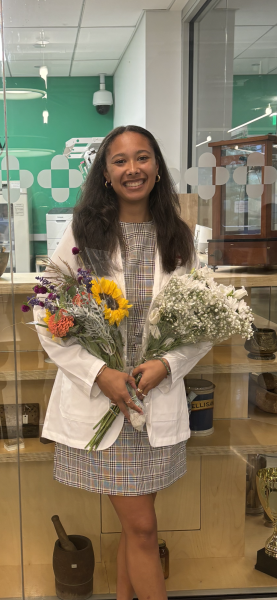
1.) How do you think St. Joe’s has changed over the years in terms of inclusivity and support for women?
“I think that St. Joe’s has actively worked towards supporting women in so many ways across all facets of the university. We have inspiring women leading our classrooms, faculty and organizations, such as President McConnell and Beth Hagovsky. These women, like so many in our community, work tirelessly to ensure that students have the best possible experience here at SJU. In addition to having strong female leaders, there has been so much support for girls’ organizations, ranging from sports to professional fraternities to scholarship and research programs.”
2.) What challenges have you found specific to women in your field? How have you overcome them?
“Women in pharmacy tend to experience bias from patients who don’t put the same trust in them as their male counterparts. In the community setting, women pharmacists struggle to earn the respect that they deserve from their patients. Although I cannot overcome this overnight, I’ve found that being confident while still kind tends to instill trust in patients. The PCP pharmacy program highlights the importance of word choice and communication skills very early on.” We learned how to diffuse difficult situations with patients, use empathic statements to make patients feel heard and seen and overall caring for patients beyond the single prescription they’re picking up. Our faculty and professors used wonderful techniques, such as videos and roleplaying activities, in class to help us practice and learn how to care for our patients the best way possible.”
3.) Are there any key changes you think are still necessary for gender equity in the academic field/workplace?
“Unfortunately, especially in the current political climate, there is less of an importance placed on gender equity in all aspects of life. Women are underpaid and undervalued, no matter how hard they work to prove their worth. There is no clear answer to this solution other than a massive societal attitude switch, one that would see all humans as simply humans, rather than categorizing them based on a single facet of their identity. Until we can get everyone to have the attitude that everyone is equal and deserves the same amount of respect in the academic and professional fields, there will always be inequities among populations.
4.) Are there anyAny womean role models or /mentors who have inspired you in your journey?
“So many women have inspired me on my journey to pharmacy school and my personal life. My mom always taught me to give everything my all. She would always say, “Yyou don’t have to be THE best, you just have to do YOUR best.” I’ve carried that with me through everything I’ve done in life, and I know that I always have her in my corner. She is an incredibly hard worker, has such a caring soul, and is always supportive of my endeavors. My biggest role model in the pharmacy field is my girlfriend, Myles Pacla (’24, PharmD ’‘26). She is constantly striving for excellence, whether it’s in class, in extracurriculars, in professional development, or in her personal life. She motivates me every day to push myself out of my comfort zone, try new things, and be the best version of myself. My first true mentor at SJU was Melissa Holland (BA ’‘24,) who showed me that being your authentic self is the most rewarding thing you can do for yourself. She is unapologetically her and constantly advocates for groups that are misrepresented. She is loud and proud about all aspects of her identity and truly inspired me to never hold back when advocating for any population.”
5.) As a woman leader in the Senate, what would you say is the greatest advice you’ve received?
“The best advice I’ve received as a woman in Ssenate is to “not forget I have a voice.” One day, I was struggling with how to initiate a difficult conversation with Senate about the various inequalities between the Hawk Hill and University City campuses. Dr. Jenny Spinner reminded me that I am on the Senate because I care and because they chose me to represent UCity’s student population. She pushed me to use my voice to advocate for all students with grievances on our campus, not only to see if anything could be done, but simply raise Hawk Hill students’ awareness of the happenings of our campus. Since that day, I never hesitate to jump into conversation and speak out for my UCity community.”
6.) How do the ideas of leadership and feminism go together for you? How do you apply both in your roles at St. Joe’sSJU?
“To me, feminism is the actions we take to include women equitably. It is not a passive approach to equality, nor an aggressive protest against men. It is the idea that all humans are capable of the same things when they want to be. Feminism is actively fighting for equality and being the ones to break societal norms. Seeing women in power is so inspiring to young girls, and it is our responsibility to take these roles and embody them, showing everyone that we are just as capable of being student leaders on campus. I am so grateful to be as involved on campus as I am. I hope that my positions and roles create a positive impact, not only on our campus and student population, but on anyone who doubts their abilities. I hope that I can inspire others the way I’ve been inspired by so many women to seize the opportunities they hope for and never let self doubt get in the way. I hope that my leadership and mentorship is able to guide other women to reach their dreams the way I’ve been so lucky to.”













































